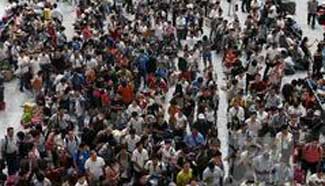JIUQUAN, Sept. 15 (Xinhua) -- China will begin building a space station that is more economically efficient and uses more data than the current International Space Station (ISS), starting as early as 2017, chief engineer of China's manned space program Zhou Jianping told Xinhua Thursday.
"Once the space lab mission comes to an end, China will start building our own space station," he said, adding that China will launch a core module of the space station around 2018.
Zhou made the remarks as China's space lab Tiangong-2 blasted off from the Jiuquan Satellite Launch Center in northwest China's Gobi desert late Thursday.
China's space station will consist of three parts, weighing over 60 tonnes, said Zhou, adding that it will be smaller than the ISS and be able to dock with two manned spacecraft and one cargo spacecraft at most.
Zhou said the station is designed to house a maximum of six astronauts.
"After the building of the space station, manned space flight will become normal, which means China will send at least six astronauts in two groups to space each year," he added.
Zhu Zongpeng, chief designer of China's space lab system, said construction of the space station will be completed by around 2020 and it will enter into service around 2022, with an initial designed life of at least 10 years.
Astronauts could soon be stationed in orbit for missions that last more than one year, Zhu said.
China has been actively developing a three-step manned space program.
The first step, to send an astronaut into space and return safely, was fulfilled by Yang Liwei in the Shenzhou-5 mission in 2003.
The second step was developing advanced space flight techniques and technologies including extra-vehicular activity and orbital docking. This phase also includes the launch of two space laboratories - effectively mini space-stations that can be manned on a temporary basis.
The next step will be to assemble and operate a permanent manned space station.
With the ISS set to retire in 2024, the Chinese space station will offer a promising alternative, and it will make China the only country to have a permanent space station after the ISS.










